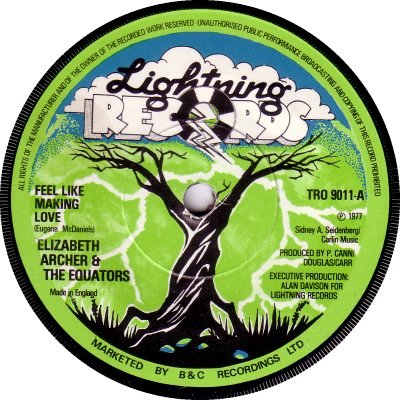
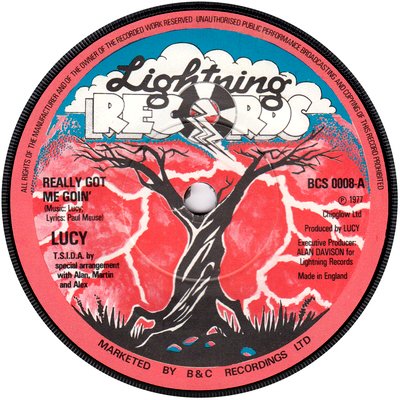
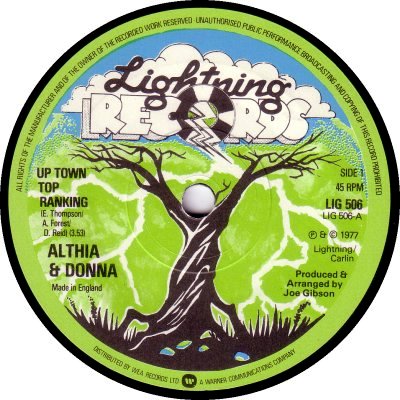
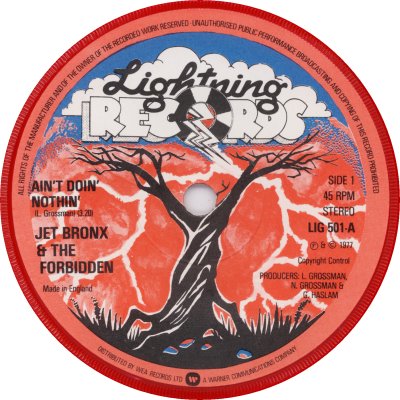
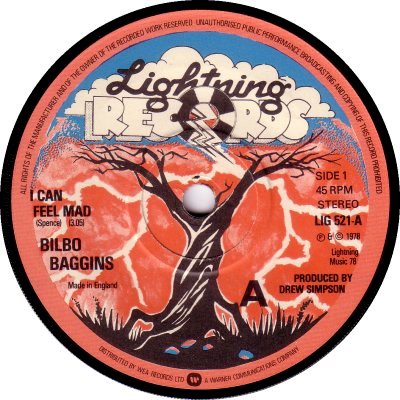
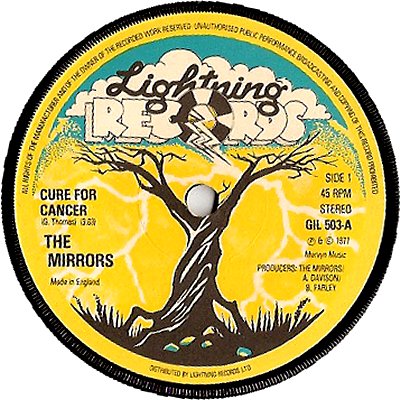
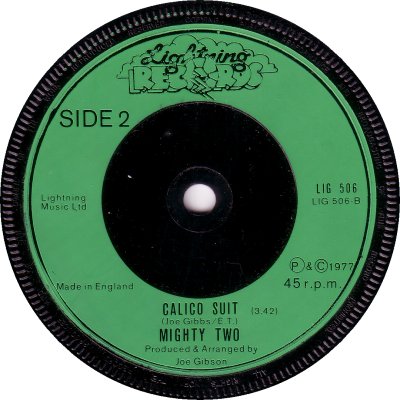
Lightning started out late in 1975 as a one-stop distributor, stocking chart singles, reggae records and a large selection of 'Golden Oldies' for jukebox owners; the opening of its wholesale warehouse was advertised in 'Music Week' of the 15th of November. Under manager Alan Davison it provided an outlet for many DIY / small independent labels during the Punk explosion, and it grew rapidly. It soon displayed an ambition to become a record company. 'MW' of the 1st of May 1976 reported that a deal had been signed with producer Joe Gibbs for the rights to issue material from his labels, and Lightning expected to release some ten singles per month from that source, which seems excessive. In the event the launch of the Lightning label didn't take place until early in 1977. A deal with Trojan lead to singles with Trojan catalogue numbers appearing on the Lightning label (1), through B&C / Saga, with distribution by Selecta. Most were Reggae, and were original productions rather than licensed material; there was a solitary Disco single, 'Express Yourself' b/w 'Rasshopper' by Oddjob (TRO-9016; 5/77), which was given a red label as opposed to the green ones of the Reggae records. These were followed by a couple of red-labelled Punk issues, which shared B&C's BCS-0000 numbering (2). Then in August 1977 Lightning singles received their own LIGS-100 series. Two records were released with the new numbers, both of them Joe Gibbs productions - Gibbs provided the company with the bulk of its Reggae product from this point - but before the series could get properly into its stride a major development took place.
'Music Week' of the 12th of November 1977 revealed that Lightning had signed a five-year worldwide licensing deal with the major WEA, which gave that company the first option on all Lightning product; at this point, according to Billboard (19th November 1977) Ray Laren was in charge. The green Reggae label and the red Rock / Pop / Disco label remained basically unchanged, but the reference to B&C at the bottom was replaced by one to WEA (3, 4). Singles which WEA opted out of licensing were handled by Lightning themselves and had their own, yellow, label (6). The various differently-coloured labels shared a common '500' numerical series during the WEA era, but the yellow-labelled singles had their prefix reversed; it became GIL instead of the usual LIG. The label design stayed the same throughout the WEA period, the only change being the addition of a small black 'A' near the bottom on most singles from February 1978 to February 1979 (5). Success came early on, when Althia and Donna shot to No.1 in the British Singles Chart with 'Uptown Top Ranking', the company's sixth single with WEA. Copies of this single can be found with injection moulded labels (7); these appear to be contract pressings made by Phonodisc. In January 1978, as if to prove that they hadn't forgotten their roots despite all these Reggae and Punk releases, Lightning launched 'Old Gold' (q.v.), a label dedicated to reissues of oldies. Then in the Spring of that year the company expanded its interests further, opening a recording studio in Berry Street both for rent and for its own in-house productions. In 1979 the company enjoyed another Reggae hit, in the form of Dennis Brown's 'Money In My Pocket' (LIG-554; 2/79), which got into the Top 20. However, it would appear that not long afterwards Lightning decided to concentrate on the reissue side of its business - while Old Gold continued on for many years there seems to have been only one record issued on the Lightning label after 1979: it was an EP by Rockabilly band Jets, 'Rockabilly Baby' (LREP-1), which came out in August 1981 and contained four old tracks. The amicable departure of Alan Davison early in 1979 may have been behind the shelving of the Lightning label, as he took all the artists except Bilbo to his new company, Laser ('MW', 24th March 1979). Lightning hadn't lost interest in contemporary material altogether, however, and it introduced 'Scope' (q.v.) in mid 1979, a label aimed initially at the Disco market ('MW', 2nd June 1979). Scope lasted until the autumn of 1980 and towards the end issued a few records of the sort which might previously have been expected to come out on Lightning. Pressing of Lightning records may well have been by Saga during the B&C era, as Saga owned B&C and Trojan at that point; the few records from the WEA years that I have been able to examine in the vinyl have been CBS or (surprisingly) Pye pressings. Thanks to James Denholm for the second scan and to Simon Hughes for the scan of the yellow label.
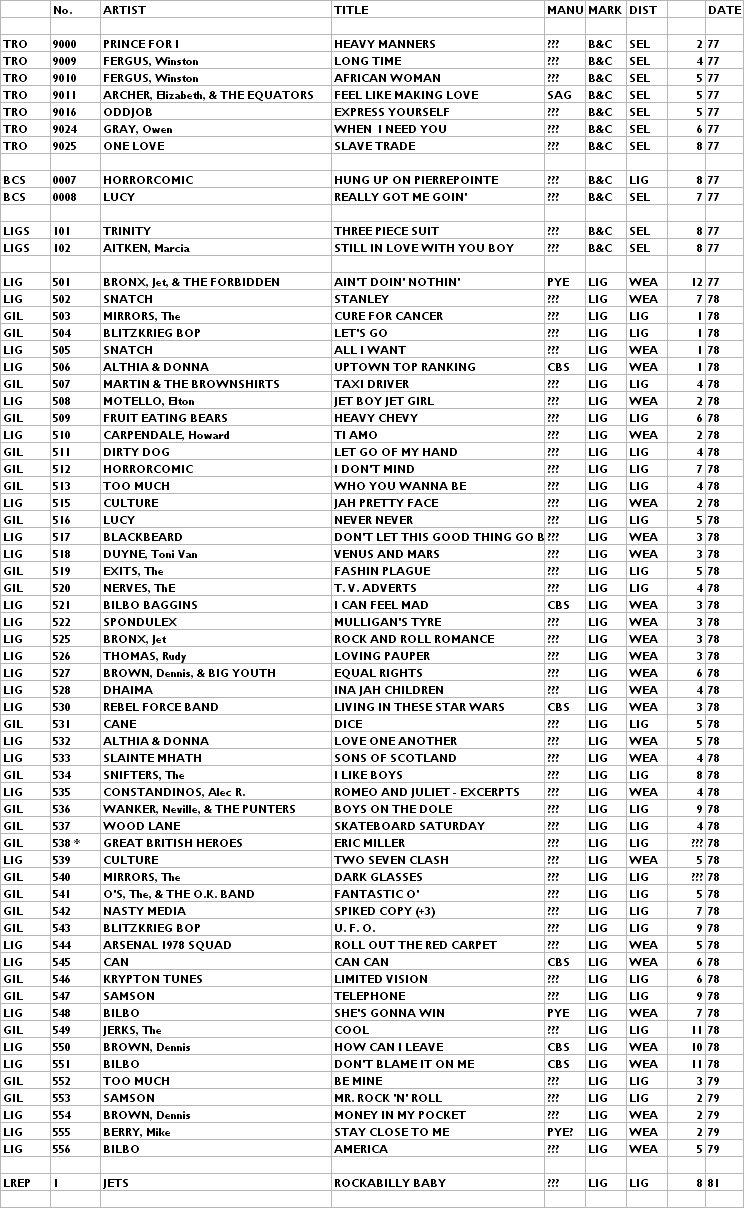


Copyright 2006 Robert Lyons.

